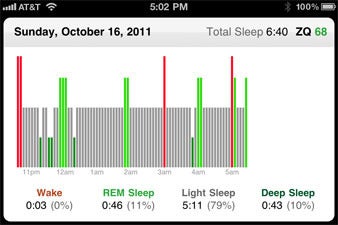Here's a scenario I never expected to experience: For the past month, I've been wearing a brainwave-sensing headband to bed every night.
What does it do? Zeo Sleep Manager - Mobile is the latest product from Zeo Inc., a Newton, Mass.-based company dedicated to helping people get a better night's sleep. The Sleep Manager tracks your sleep stages in detail and transmits that data to your smartphone via Bluetooth.
But that's only part of the story. Zeo also offers an extensive website where you can discover trends in your sleep patterns, compare your sleep data to others in your age group, find tips for getting a better night's sleep and receive coaching tailored to your trouble areas.
How does it work? Zeo Mobile has four basic parts:
- A washable, soft fabric headband with a sensor pad that reads your brain's electrical signals through your forehead
- A plastic "Zeo pod" that snaps onto the headband and houses a Bluetooth radio and battery
- A charging dock
- The Zeo Sleep Manager mobile app, available for both Android and iOS devices
Setting up Zeo Mobile is easy: You just snap the Zeo pod onto the headband and stick it on the charging dock for a few hours. Once it's fully charged, you pair its Bluetooth signal with your smartphone. You also need to download the Zeo app from the Apple App Store or Android Market.
When you're ready to sleep, launch the Zeo app on your phone and tap Track Sleep, take the headband off its dock and put it on, and then plug in your phone and tell the app to start tracking. In the morning, you can look at the app and see how much sleep you got overall, as well as exactly when you were awake, in light sleep, in deep sleep and in REM the night before. There's also a score called a ZQ that factors in all of the above.
As far as I can tell, the results were accurate, although I have no way of knowing for sure. Initially I thought Zeo wasn't reading all my waking times, but I later discovered that it deliberately doesn't record wake times of less than two minutes.
The headband itself is quite comfortable once you've adjusted it properly. It took me a night or two to find the right balance between too tight and too loose; after that I barely noticed it.
What's cool about it? Zeo Mobile is a slicker version of the company's original product, now called Zeo Bedside, which records your sleep data on an SD memory card in a bedside device. In order to get your sleep data into the company's database with that product, you have to manually upload the data from the SD card using your computer. With the mobile version, the Zeo app uploads the data automatically each morning once you've signed in via its Settings menu.
What's more, the bedside device initially cost $399, keeping it out of reach of many. Zeo Mobile costs a much more affordable $99. (The price for Zeo Bedside has now been dropped to $149.)
Simply seeing each night's sleep patterns is fascinating, but the real value comes with the coaching you receive. Zeo takes you through a 7-step program for improving your sleep. Although the basic steps are the same for everyone, the specific actions involved are customized based on your uploaded sleep data, the goals you set and other information you enter via your "sleep journal" on the website (such as how many drinks you had before bed, how comfortable your bedroom was, how easy it was to turn your mind off, and whether others woke you during the night).
 To keep you motivated, the company sends you a series of chatty emails encouraging you to keep up with your current action plan and outlining how it will likely benefit you. To be sure, much of the advice that Zeo provides is common sense. (Drinking caffeine after 3 p.m. can negatively affect your sleep -- who knew?) But it becomes harder to ignore such common-sense advice when you can see graphs detailing how various factors (including "sleep stealers" like caffeine) affect your sleep patterns, both on individual nights and over time.
To keep you motivated, the company sends you a series of chatty emails encouraging you to keep up with your current action plan and outlining how it will likely benefit you. To be sure, much of the advice that Zeo provides is common sense. (Drinking caffeine after 3 p.m. can negatively affect your sleep -- who knew?) But it becomes harder to ignore such common-sense advice when you can see graphs detailing how various factors (including "sleep stealers" like caffeine) affect your sleep patterns, both on individual nights and over time.
It almost becomes like a game or a competition: You want to improve your ZQ, boost your deep sleep, fall asleep faster and reduce your wake time -- especially compared to others in your age group. So you actually start doing the things you've always known you should do, and stop doing things you shouldn't.
What needs to be improved? Although Zeo Mobile represents a big step forward from the bedside product, it hasn't fully embraced smartphones. Why not allow me to fill out my sleep journal right in the Zeo app on my phone rather than having to go to the website? I tried to work around this by going to Zeo's My Sleep site in my Safari app, but the site is Flash-based and therefore won't work on myiPhone.
I also encountered a small glitch or two. For instance, several of the company's emails recommended specific articles on the website, but clicking their links simply took me to the Zeo home page, and searching for those titles on the website didn't turn up the articles that were mentioned.
Source www.pcworld.com







0 comments:
Post a Comment